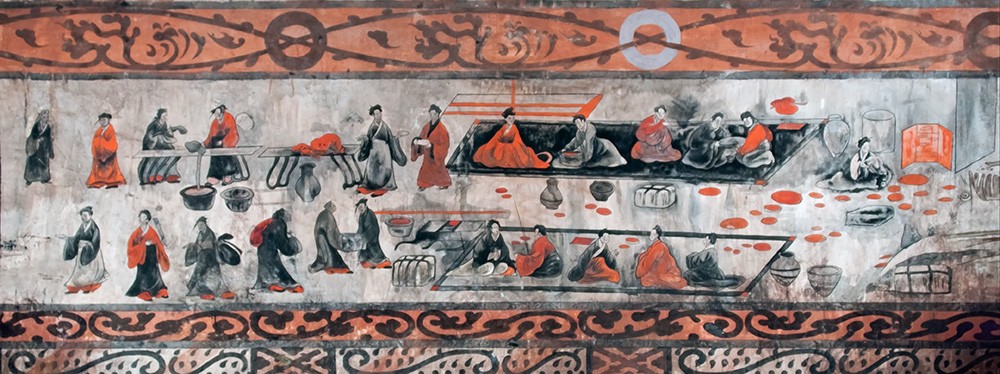
(これは中国史の本で一部分を読んで書いたまとめです。うまく表現できなかったかもしれないので、日本語で伝えたい意味をだいたい英語で一文ずつ表現しました。前の部分はここにあります。)
秦王朝の崩壊が主に恐ろしい掟から起こったと思われている。
It is believed that the collapse of the Qin Dynasty was mainly due to its extreme laws.
反乱が国中を燃え移り、血まみれな戦い後で劉邦(拼音:Liú Bāng)という人が勝ち 新しい王朝を設立し 長江の支流である漢江から漢王朝を名付けた。
Rebellion spread like fire across China, and after much bloody fighting Liu Bang emerged as victor, establishing a new dynasty which he named the Han Dynasty after the name of a tributary river of the Yangtze.
政治権力は中央したままで、劉邦が前任者の如く学者を軽蔑していた。
Government power remained centralized, and Liu Bang had much contempt for scholars, like his predecessor.
それにしても、劉邦が所有を守る手段を高めたので偉大な地主たちの支援をもらった。
Despite this, Liu Bang received the support of the great landowners because he increased protections of their property.
それに恩赦を与えて大勢な反対者が静かに農作業に戻ることができた。
Additionally, he granted amnesty to a large number of rebels who were then able to peacefully return to work in agriculture.
さらにいろんな改革・交渉・政略結婚などのおかげで数十年の平和が出来た。 Finally, thanks to several reforms, negotiations and strategic marriages, he managed to secure peace for several decades.
劉邦の一つの息子上には古いテキストが復元され儒教に従った管理者たちがまた伝統を発見した。これは儒教の復活の始まりだ。
Under one of Liu Bang's sons, old texts were restored and administrators who were followers of Confucianism rediscovered (the once lost) tradition.
当時、董仲舒という哲学者兼ねる政治家は自然の制度摂理と社会の摂理がどうやって繋いでいるかという方法を儒教にあげ、道(拼音:Dào)が支配する天の法に皇帝が従うべきで、皇帝の掟に民族が従うべきだという理論を立てた。 At that time, Dong Zhongshu, a philosopher and statesman, provided Confucianism with a way to link the natural order with the social order, establishing the theory that the emperor must comply with the law of heaven, which is governed by the Dao, and citizens must (in turn) comply with the rules/laws of the emperor.
数十年後で、講師を崇拝する伝統が生み出された。
Several decades later, a cult for Confucius was established.
漢王朝の崩壊の原因が武帝(拼音:Wǔdì)の支配している時に見つかれると思われている。
It is believed that the cause of the collapse of the Han Dynasty can be found during the rule of Emperor Wudi.
武帝が中国の範囲を広げ漢時代の全盛期になったが、一方そのために使った大量の努力や財産の代わりに国民の大多数に役が立たない贅沢な品物を主に受けた。
Wudi expanded China's territorial extent and (his reign) became the golden age of the Han Period, but at the same time, in exchange for the large amounts of effort and economic resources expended for this (i.e. expansion), they mostly obtained luxury goods that provided no benefit to the lives of ordinary citizens.
それに役人数が非常に増えていて、独占のせいで[汚職・堕落]も高まった。
Additionally, the number of bureaucratic officials grew tremendously, and monopolies caused an increase in corruption.
とうとう経済的・政治的な問題を利益にして王莽という人は九年に政権を掌握した。
In the end Wang Mang took advantage of the economic and political problems and in 9 AD seized power.
これはいわゆる西漢帝国の終わりだ。
This marks the end of the so-called Western Han Empire.
王莽は新王朝を設立したが、不法支配者と認められ、死んだ後で前の王朝が復活され いわゆる東漢帝国の始まりだ。
Wang Mang established the Xin Dynasty, but because he was viewed as a usurper, the previous dynasty was revived after his death, marking the beginning of the so-called Eastern Han Empire.
王莽はきっと優秀だったろうが、交渉が苦手で力を持っているグループとの合意を出来なくて難しく支配した。
Wang Mang was surely an extraordinary man, but he was not particularly skilled in the art of negotiations, and so failed to establish a consensus among various power groups, governing with great difficulty.
地所の範囲を限る・公立の穀物倉庫を作り穀物の値段をおさめる・金を貸すのを減るような低い利子の国ローンを作るというような改革をしようとしたが、大多数な官吏たちはそれに反対する社会層から来て問題になった。
He attempted several reforms, such as limiting the size of land estates, creating public granaries to control the price of cereals, and creating low-interest state loans that would help limit money lending, but the majority of government officials came from a social class opposed to such reforms, and thus quickly became a problem.
その改革を実行するのはその官吏たちで、結局拒否した。
Those in charge of implementing these reforms were said government officials, and in the end they refused to do so.
後で、軍的な負けや自然災害があり、皇帝が天命を失うと世論が強まったので、いわゆる赤眉軍という反乱が起こった。
Later, after several military defeats and natural disasters, public perception that the emperor had lost the Heavenly Mandate was reinforced, thus leading to the revolt known as the "Red Eyebrows."
王莽は二三年なくなり、またひどい戦いの後で元漢王朝の王子が政権を掌握し漢王朝を復活し、それに都を(西の方へ)洛陽市に移した。
Wang Mang died in 23AD, and again after much terrible fighting, a prince of the former Han Dynasty seized power and restored the Han Dynasty. He additionally moved the capital (westwards) to Luoyang.
これは西漢帝国の始まりで、より西へ帝国の範囲を広げ、おそらくローマ人と交際したことがあるかもしれない。
This is the beginning of the Western Han Empire, and they expanded the empire's territory further westward and quite possibly had contact with the Romans.
新しい民族と国々に出会ったり、香辛料などのような新しい品物を輸入したりしている時代だった。
It was a time in which they encountered new peoples and nations, and imported a variety of new trade goods such as spices.
面白いことに五つの味(甘み・酸味・辛味・苦味・塩味)の概念を基づいた中華料理の原理が当時に熟し始まった。
Interestingly, it was during this time that the principles of Chinese cuisine, based on the five flavors (sweet, sour, spicy, bitter, spicy), began to become well-defined/established.
*Image from Wikipedia, "Han Dynasty" entry: https://en.wikipedia.org/wiki/Han_dynasty#/media/File:Dahuting_tomb_banquet_scene,_Eastern_Han_mural.jpg